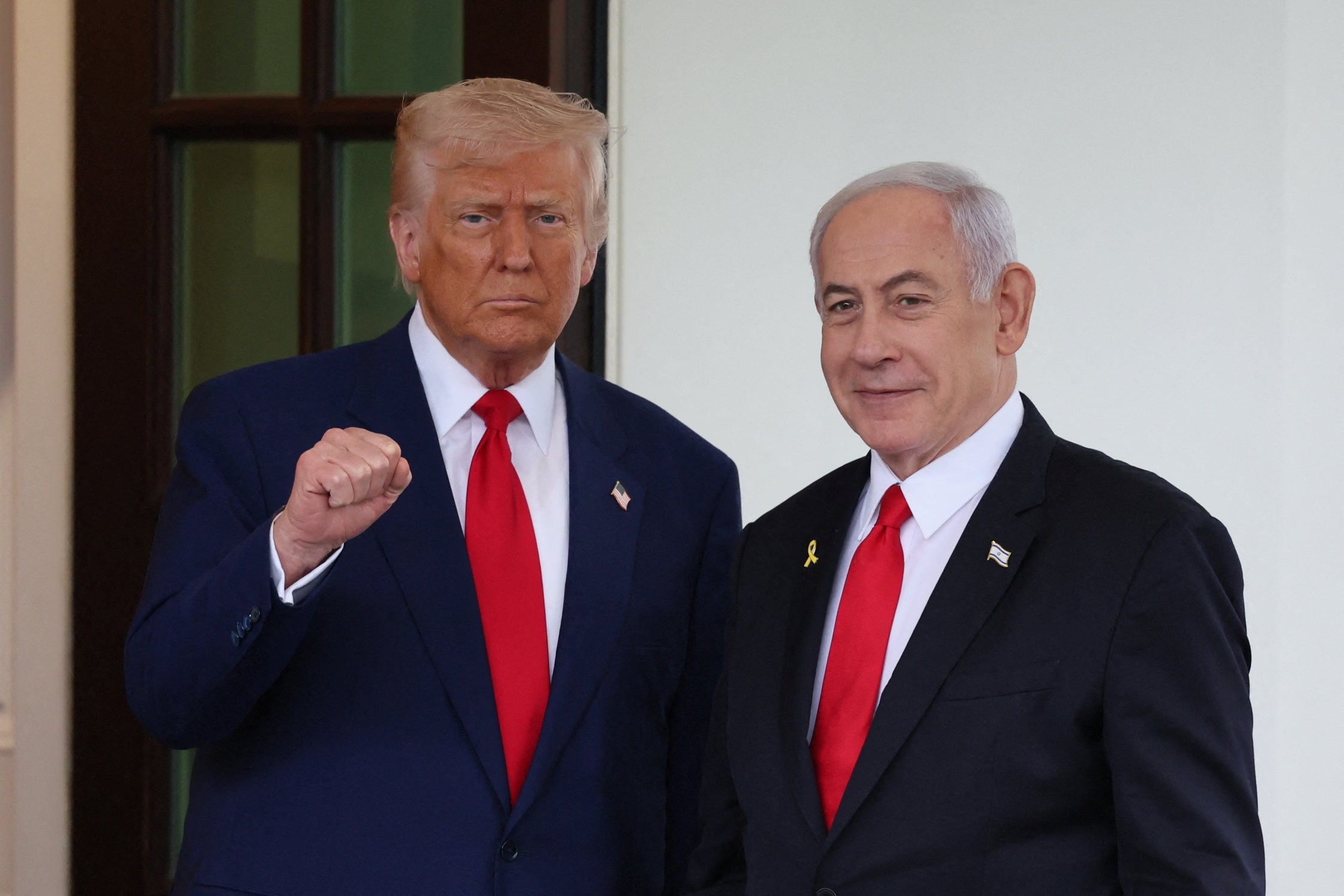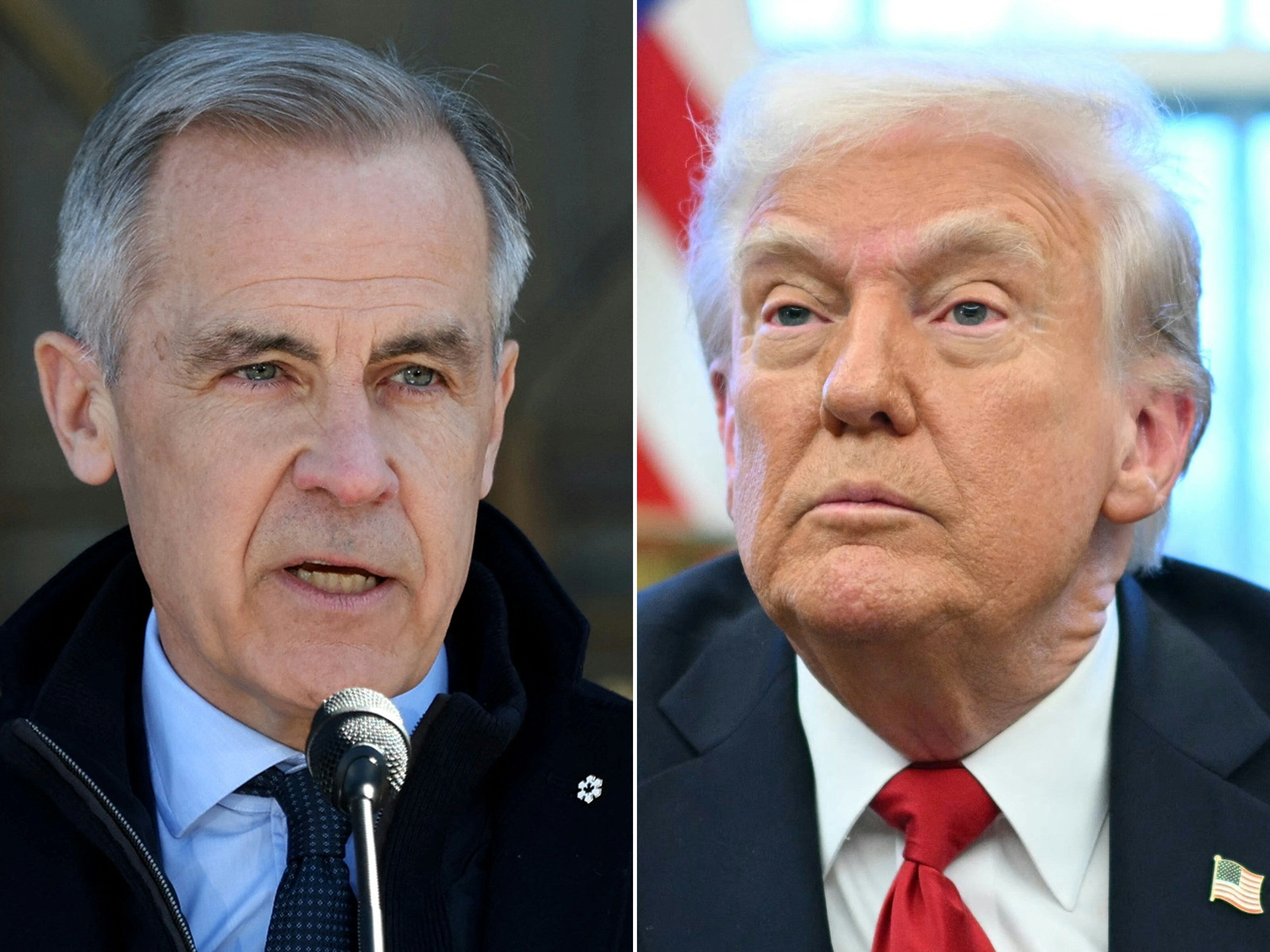Trump tariffs dwell: President dismisses tariff pause as Netanyahu vows to ‘eliminate’ US commerce limitations
London’s FTSE 100 stock index plunged a further 4.3 per cent on Monday to a value last seen in March 2024, as Donald Trump’s tariffs continue to wreak havoc on the global markets.
After the US president announced his sweeping tariffs last week, Wall Street sank again, with the S&P 500 briefly approaching bear market territory on Monday, coming off its worst week since Covid-19 began crashing the global economy in March 2020. The Dow Jones Industrial Average was down 2.3 per cent, and the Nasdaq composite 1.5 per cent lower.
The continued volatility came as Mr Trump threatened China with a further tariff of 50 per cent and said “all talks with China concerning their requested meetings with us will be terminated” unless Beijing withdraws its planned 34 per cent retaliatory levy.
But, in a possible softening of his wider stance, Mr Trump added: “Negotiations with other countries, which have also requested meetings, will begin taking place immediately.”
The EU also warned it was “finalising” a list of countermeasures tonight, with a view to implementing them next Tuesday if US negotiations fail.
Trump confirms he will not be pausing tariffs
The US will not be pausing tariffs, Donald Trump has said, confirming that they are “not looking at that”.
The president says many countries have been negotiating with Washington and they will try and make “fair deals” with each of them.
He also said the US “has been ripped off by many countries over the years”.
“We can’t do it anymore. We can’t be the stupid people anymore,” he added.
Netanyahu says Israel will ‘eliminate trade barriers’ with the U.S.
Benjamin Netanyahu has praised Trump as a true “friend of Israel” in a joint press conference following his last minute trip to Washington.
Despite the U.S. being Israel’s closest ally, they have not escaped the president’s tariffs and have been landed with a shock 17 per cent tariff on Israeli imports.
Moving on to tariffs, Netanyahu said: “We will eliminate the trade deficit with the US… We will do it very quickly and we will eliminate trade barriers.”
“We intend to do it very quickly and we think it is the right thing to do,” he says.
He adds: “Israel can serve as a model for many countries” – dozens are seeking trade deals with the US to avoid the worst effects of Trump’s tariffs.
Business secretary rejects suggestion UK being ‘passive’ in face of US tariffs
The UK is not being “passive” in response to Donald Trump’s tariffs, Sir Keir Starmer’s business secretary has insisted.
Put to him that the government had not stepped up at all, only announcing tweaks to the zero emissions vehicle mandate, Jonathan Reynolds told BBC Radio 4’s PM: “No, I think that is completely incorrect. We’ve leveraged the difficult situation with the US to advance all of those talks.
“Obviously, these deals are never … you can’t announce them until they’re done. You don’t give a running commentary on the progress of them, but that’s been a key part of that.”
He added: “I’m always keen to stress that when I talk about the need for calm, for level heads. That is not a passive response.
“There’s a huge amount going on, whether that’s on trade defence, on domestic competitiveness, on our negotiations with other countries, but that is the right response. Calmness in the face of what we’re seeing isn’t being passive, it is actually doing the right thing in our national interest to make sure we can respond to this difficult situation.”
Mr Reynolds earlier told the programme: “It is, and has been an exceptionally challenging day. A lot of people at home listening will be concerned, whether they are an individual, a business, or someone with investments, or just worried about the impact on the economy as a whole. I think our job, what we can control in the UK is how we respond to this, how we navigate our way through it.”
EU stands ready to negotiate ‘zero for zero’ deal with Trump
Financial markets across the globe posted a third day of losses, as the European Commission proposed counter-tariffs of 25 per cent on a range of U.S. goods, including soybeans, nuts and sausages.
Officials said they stood ready to negotiate a “zero for zero” deal with Trump’s administration. “Sooner or later, we will sit at the negotiation table with the U.S. and find a mutually acceptable compromise,” EU Trade Commissioner Maros Sefcovic said at a news conference.
The 27-member bloc is struggling with tariffs on autos and metals already in place, and faces a 20 per cent tariff on other products on Wednesday. Trump has also threatened to slap tariffs on EU alcoholic drinks.
The back-and-forth injected further turbulence into global financial markets, which have fallen steadily since Trump’s announcement.
EU commission proposes 25% counter-tariffs on some US imports, document shows
The European Commission has proposed counter-tariffs of 25 per cent on a range of US goods on Monday in response to Donald Trump’s levies on steel and aluminium, according to a document reportedly seen by Reuters.
Reporting after the EU warned it was “finalising” a list of countermeasures tonight, with a view to implementing them next Tuesday if US negotiations fail, Reuters said the tariffs on some goods as listed in the document would come into effect on 16 May and others later in the year, on 1 December.
Bourbon was removed from the original list the Commission was weighing in March.
White House economic advisor Miran encourages countries to approach Trump with offers to cut tariffs
White House economic adviser Stephen Miran on Monday encouraged countries hoping to escape high reciprocal U.S. tariff rates to make offers to President Donald Trump, saying the president would welcome moves to lower barriers to U.S. exports.
Miran told an event hosted by the Hudson Institute think tank that services, where the U.S. has a strong advantage, were also important, but the United States had gotten out of balance with regard to manufacturing.
Miran, who chairs the White House Council of Economic Advisers, said he believed a range of U.S. policies, including pursuing more deregulation, would keep inflation under control.
Watch: Rachel Reeves caught joking about government debt in ‘hot mic’ moment
‘Today will go down in history’
Hong Kong’s Hang Seng index dropped more than 13 per cent on Monday, marking one of its worst days on record, while Japan’s Nikkei 225 fell more than seven per cent.
Following huge growth from 2021 to 2024, the Nikkei is now down more than 20 per cent over the past year.
“It’s rare to see double-digit falls in a single day for a major stock index, yet today will go down in history,” said Russ Mould, investment director at AJ Bell.
“In essence, Asia is lumping two horrible days on the market into one. That is the fourth biggest one-day decline ever in the Hang Seng.
“We’re seeing the biggest falls in Asia because it arguably has the most to lose from Trump’s tariffs. Asian countries have thrived from selling goods to the west, with places like the US having been hungry to access cheap labour.”
White House cancels press conference with Netanyahu
The White House has cancelled Donald Trump’s planned press conference with Israeli prime minister Netanyahu, who is the first leader to meet with the US president since he unleashed his wave of global tariffs.
The pair are still expected to meet in the Oval Office office where reporters will be present, and are expected to discuss Mr Trump’s tariffs.
Greeting Mr Netanyahu with a handshake, Mr Trump ignored shouted questions from reporters about the tumbling global markets and whether he would lift tariffs on Israel.
The White House did not offer any immediate explanation for why the news conference was cancelled.

Mark Carney warns chances of US recession has shot up and will hit Canada
The probability of a US recession has risen significantly thanks to Donald Trump’s tariffs and that will have a major negative effect on the Canadian economy, prime minister Mark Carney has warned.



